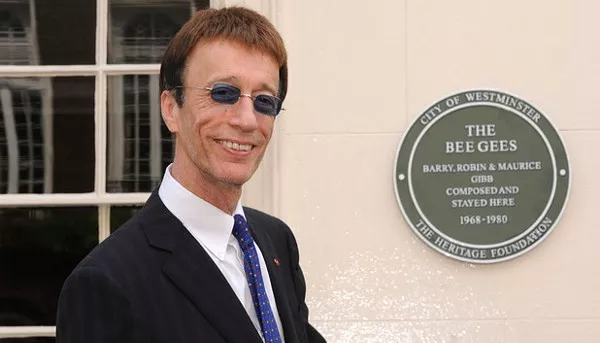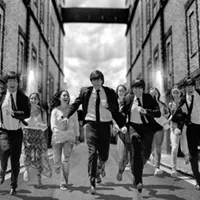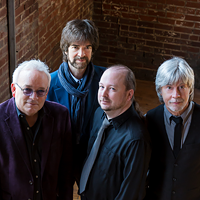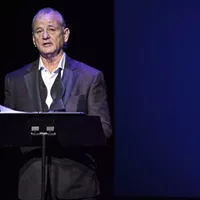Monday, May 21, 2012
News Bee Gees' Robin Gibb dies at 62
Posted By Jeff Hahne on Mon, May 21, 2012 at 9:37 AM
Robin Gibb, one of three brothers who formed the Bee Gees, died on Sunday at 62 after a battle with colorectal cancer. He is the second Bee Gee (and third musical Gibb brother) to die. Solo pop singer Andy Gibb died in 1988 from inflammation of the heart; Bee Gee Maurice died from a heart attack in 2003. The sole surviving Gibb now is eldest brother Barry, who is 65.

Robin, Barry and Maurice Gibb had two periods of pop-music success, but the period they're most known for today was their massive success during the disco era, thanks to their three-part falsetto harmonies on the hits "How Deep Is Your Love", "Stayin' Alive" and "Night Fever." Interestingly, those songs, all of which shot to No. 1, were not even on a proper Bee Gees album, but rather the soundtrack to the pop culture phenomenon Saturday Night Fever. The soundtrack went on to sell more than 40 million copies.
The Bee Gees' Saturday Night Fever hits were less notable for Robin Gibb's voice than for the interaction of the three voices together. However, Robin - whose solo voice The New Yorker recently described as the trio's "beautiful warble" - was a key to the Bee Gees' emotionality during the group's '60s and early-'70s years. He sang on a string of heartrending songs and ballads including "I Started a Joke," "Massachusetts," and the trio's first U.S. hit in 1967, "New York Mining Disaster 1941."
In 1969, the Bee Gees released the concept album Odessa, a orchestrated double-disc opus that was among the defining works of the late-'60s Baroque era of pop music that also included Love's Forever Changes, in 1967, and The Zombies' Odessey and Oracle, in 1968. It was during Odessa that the Bee Gees split up due to creative differences, primarily between Robin and brother Barry. Robin embarked on a solo career temporarily, but the trio was soon back together again, with a newer, more soulful sound on their first U.S. chart-topper "How Can You Mend a Broken Heart," in 1971.
By the mid-'70s it seemed as though the Bee Gees were becoming has-beens until the group, at Eric Clapton's suggestion, recorded a session in Miami that included a few songs with a disco beat. Those songs, including the group's second U.S. No. 1 single "Jive Talkin'," catapulted the Bee Gees back into the public eye in 1975, and group signed on with Clapton's manager, Robert Stigwood, who was producing a little movie about disco culture called Saturday Night Fever
The Bee Gees' comeback was gargantuan, eventually overshadowing everything they'd done before. It also led to their copious awards: nine Grammys including Lifetime Achievement, Legend and Hall of Fame. The trio released its final album, This is Where I Came In, in 2001.
Robin Gibb revealed his cancer diagnosis in November 2011. Earlier this year, he was hospitalized in London after falling into a coma, but woke up one week later. He released seven solo albums during his lifetime, including first and best set, Robin's Reign, in 1970. His most recent solo work was a classical project called "The Titanic Requiem," although none of Gibb's work was nearly as critically acclaimed or interesting as his enduring music with with his brothers as the Bee Gees.
Speaking of...
-

Beatles vs. Stones show returns to Charlotte stage
Apr 22, 2019 -

Re-Invasion of the Spongetones
Jun 27, 2018 -

Charlotte Rapper/Singer Day Brown Steps Up to the Mic
Apr 11, 2018 - More »
Latest in Vibes
More by Jeff Hahne
-

Chvrches ups the energy
Oct 17, 2018 -

Florence & The Machine offer a vocal showcase in Charlotte area
Oct 4, 2018 -

Bill Murray, Jan Vogler and Friends entertain with wit, classic arts
Oct 2, 2018 - More »




